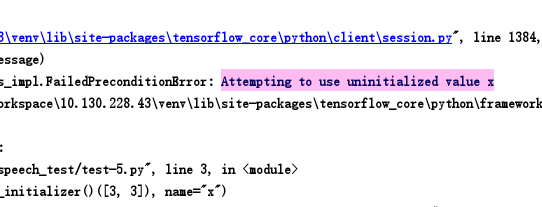sess.run(tf.global_variables_initializer()) is often used when we are using tensorflow. In this tutorial, we will introduce some tips on using it.
Why we use sess.run(tf.global_variables_initializer())?
Look at an example.
import numpy as np
import tensorflow as tf
x = tf.Variable(tf.orthogonal_initializer()([3, 3]), name="x")
y = tf.Variable(tf.orthogonal_initializer()([3, 3]), name="y")
z = x + y
init = tf.global_variables_initializer()
with tf.Session() as sess:
#sess.run([init])
np.set_printoptions(precision=4, suppress=True)
sum = sess.run(z)
print(sum)Run this code, you will get an error: Attempting to use uninitialized value x

In tensorflow 1.x, in order to use a variable, there are two steps:
1.Create a variable
We can use tf.Variable() or tf.get_variable() to create a variable, however, there is no value in this variable.
2.Assign initialized value to variable
We can use tf.global_variables_initializer() to initialize global variables, or use tf.local_variables_initializer() to initialize local variables.
tf.global_variables_initializer()
tf.global_variables_initializer() is defined as:
@tf_export(v1=["initializers.global_variables", "global_variables_initializer"])
def global_variables_initializer():
"""Returns an Op that initializes global variables.
This is just a shortcut for `variables_initializer(global_variables())`
Returns:
An Op that initializes global variables in the graph.
"""
if context.executing_eagerly():
return control_flow_ops.no_op(name="global_variables_initializer")
return variables_initializer(global_variables())It will call variables_initializer() function to initialize global variables.
variables_initializer() is defined as:
@tf_export(v1=["initializers.variables", "variables_initializer"])
def variables_initializer(var_list, name="init"):
"""Returns an Op that initializes a list of variables.
After you launch the graph in a session, you can run the returned Op to
initialize all the variables in `var_list`. This Op runs all the
initializers of the variables in `var_list` in parallel.
Calling `initialize_variables()` is equivalent to passing the list of
initializers to `Group()`.
If `var_list` is empty, however, the function still returns an Op that can
be run. That Op just has no effect.
Args:
var_list: List of `Variable` objects to initialize.
name: Optional name for the returned operation.
Returns:
An Op that run the initializers of all the specified variables.
"""
if var_list and not context.executing_eagerly():
return control_flow_ops.group(*[v.initializer for v in var_list], name=name)
return control_flow_ops.no_op(name=name)
We should notice:
global_variables() will return a variable list, which contains all gloabal variables.
To summarize, we use sess.run(tf.global_variables_initializer()) in our code, it will initialize all global variables. However, it may cause some errors if we load a pre-trained model for fine-tuning.